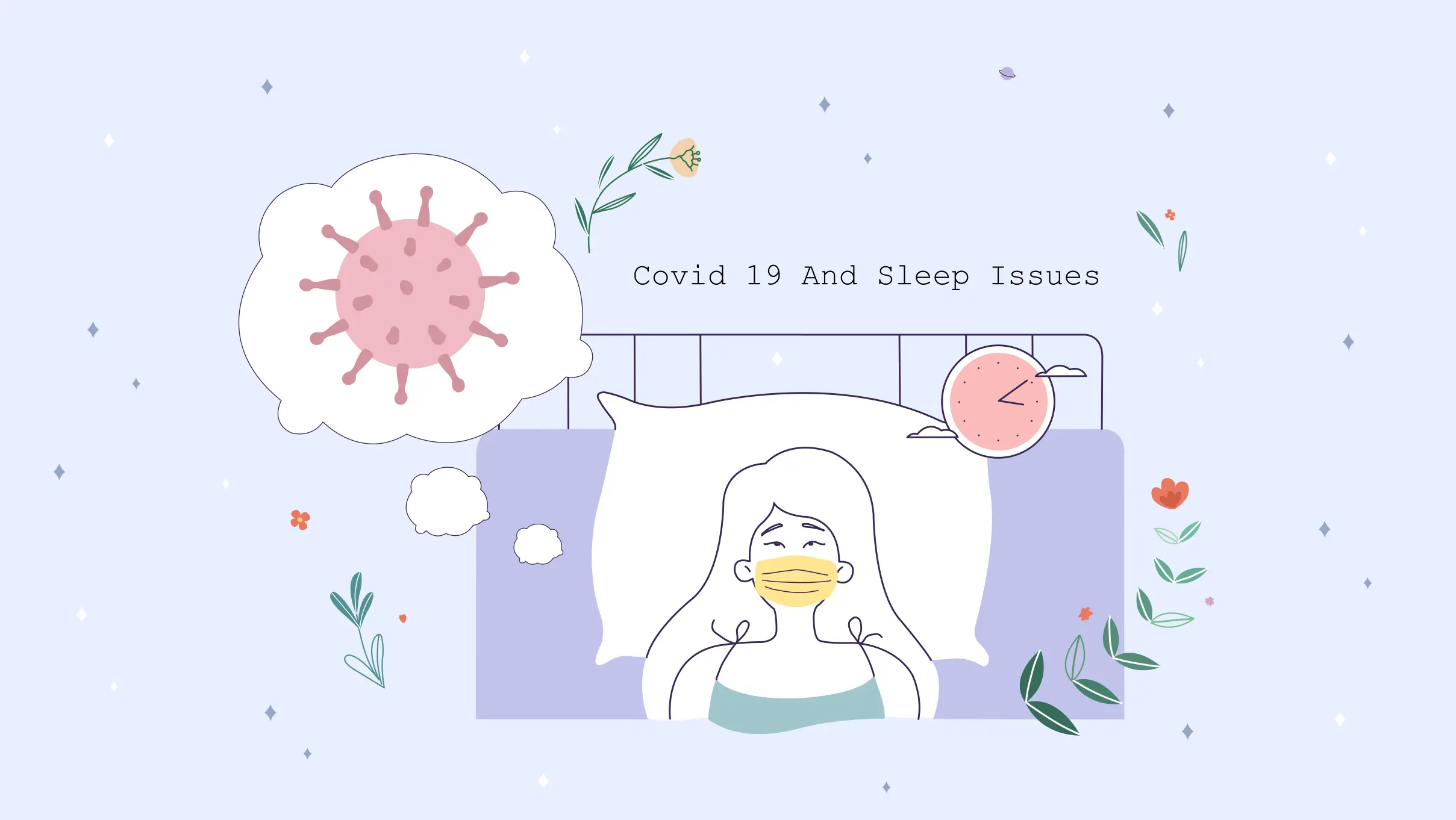Tips to Improve Sleep During Covid-19
Written by

Medical reviewed by


COVID-19 pandemic impacted almost every aspect of peoples’ lives profoundly. The increase in people’s stress levels due to the anxiety of struggling with the disease and the grief of losing loved ones has significantly impacted their sleep. The environment of fear and uncertainty resulting from the pandemic has helped researchers establish a clear link between Covid-19 and sleep issues. This article offers information that can help people understand the relationship between covid and sleep problems and find the best ways to resolve the same.
Covid-19 and Sleep: What Are the Challenges?
People had been facing the problem of sleep deprivation long before the first case of Covid-19 was reported. However, the pandemic caused an exponential rise in the problems of insomnia and sleep problems resulting from psychological issues. This was mainly due to the following challenges people faced during the pandemic.
Infection and COVID-19
Covid-19 is a viral infection with flu-like symptoms, including cough, cold, and fever, although these tend to vary from person to person. Hence it is not surprising that, like most other infectious diseases, people suffering from Covid-19 face sleep problems. These problems persist not only during the infection period, but in most cases, they are a part of the long-term consequences of the disease.
Disruption of Daily Life
The Covid-19 pandemic has disrupted the normal life of people in unimaginable ways. People have been forced to adjust their everyday schedules or completely change their day-to-day activities, affecting their sleep. The increased inactivity due to the lockdown and the absence of time anchors that helped people keep track of time has also contributed to enhancing Covid-19 and sleep issues.
Caregiving
People who have been forced into the role of informal caregivers for infected patients are also known to struggle with sleep issues. The stress of shouldering the additional responsibility of caring for a sick loved one while completing the usual professional and household tasks leave such caregivers with little time to get enough sleep.
Excess Screen Time
The complete shutdown of outdoor social activities during the pandemic has resulted in people overspending long times in front of their screens. Excessive screen time, especially during the later half of the evening, can have a profoundly negative impact on sleep time by making it difficult for the brain to wind down and suppress melatonin production.
Anxiety and Worry
The fear of getting infected has been the most significant cause of increased anxiety among people. This, combined with the patients’ worries about the sustenance of their loved ones and their recovery and well-being, has been responsible for sleep disruption. The anxiety and fear among people about the health and safety of their loved ones have emerged as one of the critical causes of sleep problems.
Depression and Isolation
The Covid-19 pandemic has been responsible for creating a crisis-like situation across the globe, triggering a sense of isolation and depression among the people. Both these factors have been closely linked to the problem of loss of sleep and other mental health disorders.
Stress and Fatigue
The limited outdoor movement, the pressure of fulfilling professional responsibilities while handling kids of all ages, and the tension of keeping their loved ones safe have been responsible for causing mental and emotional stress and fatigue in people. All these factors have created sleep issues that did not exist before.
Altered Dreams
The high stress and anxiety people face during the pandemic are known to have changed the way people dream. Infected people have experienced an increase in the frequency of nightmares, while people generally can remember their dreams better. This change in dream activity is also responsible for the link between Covid-19 and sleep.
Effects of Medicines
Many times people may experience a reduction in their sleep due to the effects of various medicines, especially among patients suffering from comorbidities. This is because such medication may cause the suppression of the secretion of sleep-inducing hormones or impact brain activity in a manner that results in enhanced sleep issues.
How To Sleep With Covid?
Despite the various challenges posed by the pandemic, getting enough sleep is essential for people to ensure faster patient recovery and even keep the infection at bay. However, this is often easier said than done, as is evident from the fact that most people have been struggling to get enough sleep, irrespective of whether they are infected or not. Following the tips below can help people effectively overcome the problems of Covid-19 and sleep issues and promote better health and faster recovery.
Best Position To Sleep During Covid
A recent study has shown that sleeping in a prone position is the best while suffering from Covid. In medical terms, sleeping on your stomach is called the prone position. This position is believed to provide better expansion of the lungs and back. This helps fluid removal from the lungs, leads to improved oxygen levels and better healing. Other than this, the best sleeping position might vary from person to person as per their body types, and the areas where the virus has affected them.
Create a Regular Sleep-Wake Schedule
Following a regular sleep-wake schedule makes it easier for the body to maintain a consistent sleep structure. It helps maintain the body’s natural circadian rhythm, making it easier for people to fall asleep on time. Minimising the variation in the sleep schedules promotes a sense of normalcy during the crisis and diminishes the consequences of Covid-19 and sleep issues.
Create A Worry Log
Stress is one of the key contributing factors responsible for sleep disruption during the pandemic. One way to overcome the problem and retain a healthy sleep schedule is by creating a worry log where people can maintain a record of things they tend to worry about. Doing so, especially before bedtime, helps to free people’s minds of nighttime stress.
Watch What You Drink
Paying attention to what they drink before bedtime is also an effective way for people to overcome their sleep problems. People should avoid drinking caffeinated drinks or consuming alcohol before going to sleep. While drinking the former can make it difficult for people to fall asleep, drinking the latter creates an unhealthy waking-up experience and can also impact sleep quality.
Engage in Relaxing Activities Before Bedtime
Taking part in activities that can help the body and mind to feel relaxed before going to bed can help people sleep better and avoid various health issues. This may include cutting down the screen time before going to bed, developing the habit of reading, and listening to soothing music are some activities that people can follow to ensure the same.
Take a Warm Bath
A warm bath just before bed can help people feel relaxed and fall asleep faster. In addition to easing the soreness of the muscles, a warm bath also helps lower the body’s core temperature, further promoting healthy sleep. This is because a reduction in the core temperature signals the body that it is time to sleep.
Use a Humidifier
Lack of enough moisture in the air makes it difficult for people to sleep comfortably at night, especially when infected. To resolve this problem, people should consider placing a cool-mist humidifier in their room while going to sleep. This helps to add moisture to the air of the room and eases the sensation of congestion, besides providing relief from coughing.
Sleep When Tired
People should make it a habit to go to sleep when they feel tired as tiredness is a sign given by the body that it needs rest without delay. When people tune into their sleep drive, they tend to enjoy a healthier sleep which helps to improve their immunity and ensures that they stay active and energetic throughout the day.
Elevate Your Head
Congestion in the nose and the chest is one of the primary reasons that prevents the infected people from enjoying a healthy sleep. In such cases, elevating the head by placing a couple of fluffy pillows underneath can help ease the stuffiness. This method makes it easier for people to fall asleep and get relief from Covid-19 and sleep issues.
Utilise Relaxation Techniques
People have been experiencing a significant increase in their anxiety levels during the pandemic. That is why people need to adopt various methods to relax their minds before going to bed. Spending some time meditating before bed is one of the most effective ways to improve sleep. Similar results can be obtained by practising breathing exercises before hitting the pillows.
Creating A Sick Room To Avoid Covid-19 Infection Spread
Taking care of a single person in the family infected by Covid-19 can be extremely tiring, which is why it is important to prevent the infection from spreading. For this, it is advisable to create a sick room for the infected person and place everything that the patient needs in the room to avoid unnecessary contact with other family members and provide them enough time to relax.
Coronasomnia: Symptoms and Solutions
There is no denying that Covid-19 has significantly increased sleep problems among people of all ages. This has resulted in the emergence of the term Coronasomnia, which describes people’s sleep troubles due to the pandemic. These sleep issues are a direct consequence of the increased levels of stress and anxiety brought on by the pandemic. Moreover, the uncertainty about how and when the pandemic will end and the major disruptions people have been forced to face in their lives have also contributed to its growth.
The symptoms of Coronasomnia are quite similar to those experienced by people having sleep problems. It is often characterized by difficulty falling asleep at night, high levels of stress and anxiety with increased blood pressure levels, and deterioration of cardiovascular and metabolic functions. Many people also experience a decline in their cognitive power, sudden mood swings, and unexplained weight gain as a direct consequence of Covid-19 and sleep issues.
There is no specific solution to avoid the problems resulting from Coronasomnia. However, people may try following a proper sleep schedule, taking a break from information overload, and doing activities that can help to relax the body and the mind. In addition, doing simple exercises and maintaining a healthy diet and fitness routine can also help to avoid the problem of corona and sleep.
Conclusion
Covid-19 and sleep issues go hand in hand, and ignoring the problems can also contribute to further deteriorating the health of the people suffering from the same. Gaining a proper understanding of the challenges associated with covid and sleep is the key to minimizing the long-term impacts of the pandemic. Implementing the above-discussed best ways to tackle the issues and avoid the problem of Coronasomnia can further help people to manage their health better.
FAQs
Does covid make you sleep a lot?
Like any other illness, during Covid, you might find it difficult to follow your sleep pattern. While some people find it difficult to fall asleep, others might find waking up more difficult.
How long can fatigue last after a COVID-19 infection?
For most people, fatigue lasts two to three weeks and is more in the first week. However, some might take longer to completely recover from it.
Why is getting plenty of rest important for COVID-19 patients?
A healthy immune system lowers the risk of infection and can help those fighting a virus recover if they get enough sleep. On the other hand, lack of sleep erodes the body’s immune system and increases the risk of virus infection.
people like this article
Written by

Medical reviewed by



